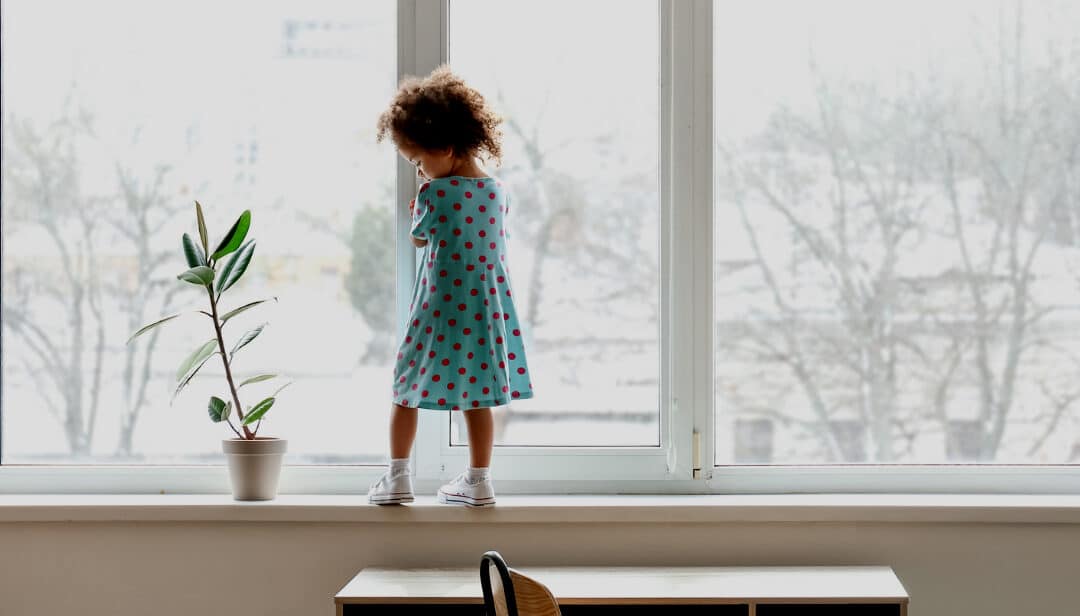It’s the perfect time of year to open the windows and enjoy the fresh air. Yet open windows can be a hidden danger for kids. It’s easier than you may think for young ones to slip through and fall. Fortunately, window accidents are preventable with the right safety measures. This season, keep your home and windows secure for your little ones.
What makes windows dangerous?
Children are naturally curious. They like to climb and explore. Window screens are designed to keep bugs out, but not hold children in. Even a small child has the strength to push out a screen. Children under the age of 5 are especially at risk if this happens. Their heads make up a larger percentage of their bodies as compared to adults, so they are likely to fall headfirst.
Some windows are more enticing or easier to access for young kids:
- Windows with deep windowsills or built-in window seats
- Windows that overlook a play area or place of interest to a child
- Windows that are near furnishings where children can climb to reach them
- Windows that do not have safeguards and do not lock
Types of Windows
You want to be concerned about any type of window that can open.
- Single hung windows have a bottom sash that opens.
- Double hung windows have bottom and top sashes that open.
- Bay windows often have side angled panels that can open.
- Casement windows swing open to the side, often using a hand crank.
- Awning windows swing up in a similar way to casement vehicles.
- Horizontal sliding windows open by sliding to the side.
- Picture windows generally do not open.
Window Safety Devices
You can buy safety devices that limit or block window openings at your local hardware or home store and online. Look for ones that are compliant with ASTM International specifications. ASTM stands for the American Society for Testing and Materials, and it establishes standards for a wide range of products, including window fall prevention devices. Place these devices on every window that can open, including first floor windows. That still can be a significant fall for a young child.
Window Guards
Window guards block the opening of a window. There are two basic kinds, each of which needs to be properly fitted.
- Fall prevention window guards use closely spaced bars that are secured to the window frame. Made of durable material such as steel, these guards may be installed with screws or bolts. They usually have a release mechanism for quick access to disable them.
- Fall prevention screens are different from standard window screens that protect from bugs. These screens are designed to withstand as much as 60 lbs. of pressure or more.
Window Stops
Window stops restrict windows from opening fully. Make sure to set them so windows open a maximum of 4 inches.
Pro Tip: Once you install a safety device, practice removing it, so you’ll know how to do so if you need to exit via the window in an emergency.
Window Cords
Young children also can be entangled and strangled by window cords. Remove the cords or keep them well out of reach.
- Retrofit old cords with cord stops or cut looped cords and replace with tassel ends.
- Switch to cordless blinds for your window treatments.
Other Window Safety Tips
- Close and lock windows when an adult is not in the room to supervise.
- If you have windows that can open at the bottom and the top, open them only at the top to help prevent falls.
- Move furniture and cribs away from windows so kids cannot climb on them. Make sure that furniture is a minimum of 3 feet from windows.
- Keep your eyes on children when the windows are open. Make sure they do not get too close.
- Teach children not to play near windows, not to lean on windows, and to always ask permission before opening a window.
- Regularly inspect and repair broken windows as soon as possible.
- If you have a hard surface outside underneath your windows, consider adding soft grass, bushes or other landscaping that could cushion a fall. This could ultimately help to lessen an injury.
- Open, unsecured windows can also be a danger to pets. Keep your fur babies safely away from open windows and balconies.
- Discuss window safety with your child’s daycare, babysitter and family members. Make sure everyone is aware of the safety precautions to take.
This article is furnished by California Casualty, providing auto and home insurance to educators, law enforcement officers, firefighters, and nurses. Get a quote at 1.866.704.8614 or www.calcas.com.
- Surprising Careers for EMTs - February 27, 2026
- How to Properly Pack Your Fridge - February 24, 2026
- Staying in Control with Driver Assist - February 13, 2026

